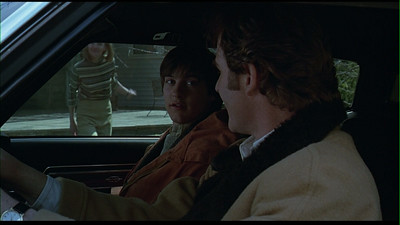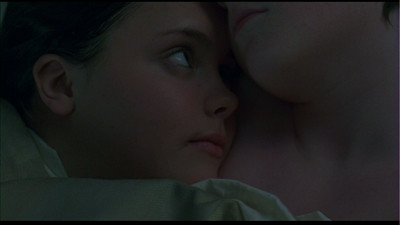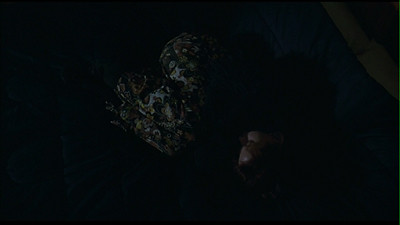
When most storytellers want to use a natural occurrence as a metaphor for a great cleansing, they usually turn to something Biblical, like a massive fire or flood. Leave it to Ang Lee, the master of restrained emotions, to instead gravitate to Rick Moody's novel
The movie opens at the ending, with Tobey Maguire at his gawky adolescent best playing 16-year-old Paul Hood, riding a train back from New York after a failed attempt at a night of debauchery. He's reading a Fantastic Four comic book and pondering the central concept of the series: the superhero team as a stand-in for the nuclear family, the curse of outrageous power being analogous of the emotional power that tears apart a regular family unit. It's Thanksgiving weekend, a manufactured excuse for people to gather, take time off from work, and get up to trouble, and Paul is visiting his Connecticut home after spending the rest of the autumn at boarding school.
The citizens of New Canaan--a modern Biblical name if there ever was one--are at an interesting point in history. The hopefulness of the '60s is about to give way to the cynicism and wayward morality of the '70s. Nixon is on his way to impeachment, and the morning after for the party of the previous decade is dawning. For the affluent denizens of this town, they are also at the cusp of new innovation in technology, both large and small. The Hoods' neighbor, Jim Carver (Jamey Sheridan), is on the groundfloor of silicon chip development, but he's also the mastermind behind the Styrofoam peanut. It's hard to say which feels more exciting or important.

Ma and Pa Hood, as played by Kevin Kline and Joan Allen, aren't so much in a loveless marriage as they aren't sure where the love has run off to hide. Both feel trapped in their situation. Ben Hood is a nice guy with a good job, but he doesn't see the point of this endless charade and yearns for someone to talk to. Thus, he turns his affair with Janey Carver (Sigourney Weaver) into a gabfest that she has to shut down in order to remind him that he's in her bed to have fun.
For her part, Elena Hood is also seeking some kind of outside thrill, some kind of freedom or meaningful experience that will remind her that there is more to life than can be contained in her house. Her blossoming young daughter Wendy (Christina Ricci) reminds her what it was like to be young, to ride a bike and shoplift. Ironically, Wendy mistakes her parents' malaise for a lack of awareness, for a failure to see that a country run by Dick Nixon is a country run on lies. They see it, they are just stuck in the middle of those and many other lies, and it's easier to keep the covers on than lay bare the truth.
The storm hits the day after Thanksgiving, and it serves to put a halt on the sexual turmoil that is heating up all around New Canaan. Screenwriter James Schamus sees the disparity between the fumbling of the young and the old. While young Paul heads back to the city to try to cop off with the oddly named Libbets (Katie Holmes), his sister is making clumsy attempts at physical connections with the Carver boys, the spacey Mike (Elijah Wood) and the younger, black-humored Sandy (Adam Hann-Byrd). Talk about uncomfortable, imagine your dad stumbling out of his mistress' bedroom to find you on the couch with her son! On the grown-up side of things, group therapy has given over to group experimentation, and one of the neighbors (Allison Janey) is throwing a key party. This is where attending couples throw their keys into a big bowl, and at the end of the night, the ladies randomly choose that night's partner by fishing them out. Here Elena will test Ben, and all the adults will test themselves. For all of their supposed experience, they are just as clumsy at connecting with the turmoil inside their own bodies as their children.

Once the freeze hits, The Ice Storm moves away from its sardonic tone and gets real, slipping ever so calmly into the realm of Greek tragedy. Lee has pulled a cunning sleight of hand trick, having lead us to believe his film is little more than a satire of the banal concerns of middle-class America. The director has a lot of fun with the snappy veneer of the 1970s--the hideous fashion, the obsession with pointy angles, and even the glass fruit. Ben Hood brags about his new cologne, brand name of Musk, while Wendy watches "Divorce Court" and "Green Hornet" on TV. The movie almost looks over designed, like we've landed on an alien planet where butterfly collars and brown paisley is the norm.
It's an intentional culture shock, however, with the materialism of the '70s being an all-encompassing symptom of the greater problem. Again, the more ridiculous the cover, the better chance people will believe you're as shallow as you want to be. This is the thaw that is the key to Moody's metaphor: the façade has to drop, real emotion has to return, if these people are going to survive.
The Ice Storm is as close as anyone can get to a note-perfect film. There is nothing out of place here, not a single misstep. Released in 1997, it's a tremendous convergence of talent. Just look at that cast! Kevin Kline, Joan Allen, Sigourney Weaver, Christina Ricci, Tobey Maguire, David Krumholtz, Allison Janney, Elijah Wood--how do you put together such an ensemble? There is hardly anyone in this movie that didn't go on to do plenty more. It's difficult to convey the enormity of talent at work here, and the subtlety with which they pull off this job. As heavy as it sounds, The Ice Storm is light as air, passing by with a quick and comfortable ease, brimming with a self-belief that wraps the viewer in the experience, erasing any sense of time or separation of audience and screen. Ang Lee moves the camera through the picture with an unobtrusive grace so that the filmmaking never shows through, something only a rare master can do. It's very hard making it look so easy.
Yet, it's that confidence that makes The Ice Storm timeless. A film about the 1970s made in the 1990s still reverberates as contemporary and new. To paraphrase Pogo, we have met these Americans, and they are us.

For technical specs and special features, read the full article at DVD Talk.

No comments:
Post a Comment